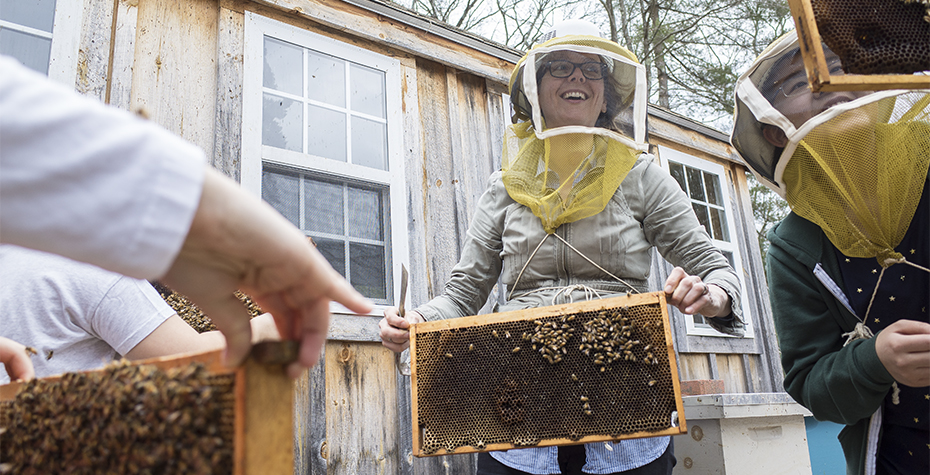New Research Offers Clues As To Why Honey Bee Colonies May Be in Decline

News about Wellesley’s science programs is always interesting, but there’s one area of research that’s sure to generate buzz every time: honey bee ecology. A new study by Heather Mattila, Knafel Assistant Professor of Natural Sciences, Assistant Professor of Biological Sciences, and a leading honey bee ecologist, offers new clues about the reason why colonies may be in decline -- an important topic because bee losses have enormous ecological and economic consequences.
The study, published in the April 8 issue of PLOS ONE, was co-authored by Hailey Scofield ’13. It is the first to show that nutritional deficits early in life can have far-reaching consequences for adult honey bees, including effects on complex behaviors like foraging and waggle dancing -- which are vital to the health of a honey bee colony because they are the key means by which honey bees acquire food supplies like nectar and pollen, and communicate with other bees about the location of food sources and nest sites.
“Nutritional stress has long been known to shorten bees’ lifespan,” Mattila said. “But we’ve never had such a clear understanding of its impact on the tasks they perform, or known that its effects persist until their last days, even when bees have plentiful food as adults.”
The need to study nutritional stress in honey bees has grown pressing in recent years. In 2013, the U.S. Department of Agriculture and the Environmental Protection Agency named nutritional stress one of the top research priorities for understanding unexplained losses of honey bee colonies, a phenomenon known in the U.S. as Colony Collapse Disorder (CCD).
Bee pollination accounts for over $15 billion in food crops and $150 million in honey annually in the United States alone. If bees vanish, many plants, including vital food crops like apples, almonds, berries and cucumbers, may also be at risk.
Researchers believe there may be several interrelated factors contributing to bee decline, including nutritional stress, loss of foraging habitat, pesticides, pathogens, and parasites. These concerns prompted President Obama to form a Pollinator Health Task Force in 2014, an unprecedented action that named studies of the effect of poor nutrition on bees as one of its primary goals.
Wellesley’s study is one of the few to be conducted entirely in a natural hive environment, which allowed larvae and adults to function in normal colonies, rather than in the incubators and cages that are more typical of nutrition studies. This unique methodology allowed Mattila, Scofield, and their undergraduate research assistants to observe the bees foraging and dancing in a natural context, activities they would not be able to perform in artificial lab conditions.
Mattila and Scofield were assisted in their research for this paper by Amanda Gardner ‘14, Rachel Reed ‘14, and Catherine Oleskewicz ‘14. The Essex County Beekeepers’ Association of Massachusetts provided funding. Scofield will begin a Ph. D program in Neurobiology and Behavior at Cornell University this Fall.
The Mattila lab continues to explore the relationship between poor nutrition and honey bee foraging with a study that is supported by the North American Pollinator Protection Campaign. The lab’s current undergraduate research assistants are Anne Shen ‘17, Anita Yau ‘17, Amina Ziad ‘17, and Rachel Hale ‘18.
